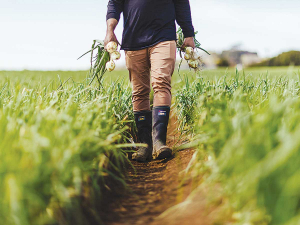T&G Global apple returns jump 25% on strong 2025 season
T&G Global says its 2025 New Zealand apple season has delivered higher returns for growers, reflecting strong global consumer demand and pricing across its Envy and Jazz apple brands.
 T&G Global and Zespri – are teaming up with Plant & Food Research on a new project investigating regenerative horticulture.
T&G Global and Zespri – are teaming up with Plant & Food Research on a new project investigating regenerative horticulture.
Two of New Zealand’s largest horticultural businesses – T&G Global and Zespri – are teaming up with science organisation Plant & Food Research on a new project investigating regenerative horticulture.
It will look into researching, developing, defining and promoting sustainable regenerative horticulture practices within the kiwifruit, apple and berry industries. Plant & Food believes the project has the potential to be one of the most extensive horticultural research programmes in NZ. It is partially funded through the Ministry for Primary Industries’ (MPI) Sustainable Food and Fibre Futures Fund.
The first part of the project will involve an exploration of regenerative practices and market analysis. The goal of this will be to move to a longer-term programme of research – including scientific and market validation – along with the implementation of science and grower-backed practices in regenerative horticulture.
T&G Global’s Gareth Edgecombe says the project is hugely exciting for the industry.
“For generations, we’ve grown premium, healthy fresh produce for consumers around the world, evolving our practices as our knowledge grows and consumer needs change,” he explains
“With consumers and businesses alike seeking to consume and produce food that improves, enhances and supports the environment in which we grow in, we, together with Zespri and Plant & Food Research, want to validate and advance regenerative horticultural practices in NZ.”
Edgecombe says while a lot of global research has gone into regenerative agricultural practices, the same can’t be said for horticulture. He add that the sector is heavily nuanced and relies on continual research and innovation into growing practices, pest and disease management, and on orchard management practices.
Zespri’s Rachel Depree says the kiwifruit marketer has a strong commitment to sustainable practice. She believes this project represents an opportunity to explore what the regenerative horticulture concept could mean for the NZ kiwifruit industry.
“Our market research also indicates consumers are increasingly interested in the idea of regeneration,” Depree explains.
“It’s important we understand how these practices link to this emerging concept of regenerative horticulture and what value there is in this for our consumers and our growers.”
The first year of the project is currently underway and focused on conducting scientific research on what is known about regenerative practices.
In parallel, market analysis will be undertaken to understand consumer perceptions and drivers. This will include working with iwi and growers to collaborate and build a widely agreed definition of regenerative horticulture for the industry.
Plant & Food Research’s Dr Brent Clothier says regenerative agriculture means different things to different people and it’s important to put any global principles into a New Zealand context.
“In general, our growers are well connected to what their land needs to produce high yields and high quality,” he adds. “For NZ, regenerative horticulture is also about better engagement with workers, linking with communities, and the principles of Te Taiao and the mātauranga that underpins it.”
Clothier says if the NZ hort sector wants to remain competitive in the global marketplace, it’s important it uses scientific analysis to quantify the impact of our horticultural practices on the land and soil health in the long term.
“We must align our practices and our reporting with what the consumer expects from our premium produce.”
The World Wide Sires National All Day Breeds Best Youth Camp Best All Rounder plaudit has become family affair, with 2026 Paramount Cup winner Holly Williams following in her sister Zara's footsteps.
DairyNZ is giving New Zealand farmers a unique opportunity to gain hands-on governance and leadership experience within the dairy sector.
Herd improvement company LIC has posted a 5.2% lift in half-year revenue, thanks to increasing demand for genetics.
According to the latest Fresh Produce Trend Report from United Fresh, 2026 will be a year where fruit and vegetables are shaped by cost pressures, rapid digital adoption, and a renewed focus on wellbeing at home.
The Roar is a highlight of the game hunting calendar in New Zealand, with thousands of hunters set to head for the hills to hunt male stags during March and April.
OPINION: The past few weeks have been tough on farms across the North Island: floods and storms have caused damage and disruption to families and businesses.